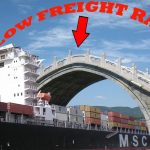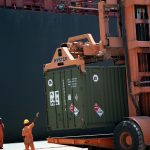BNSF May Abandon Los Angeles Rail Gateway Over Lawsuit
 A $500 million rail project that would serve the Port of Los Angeles, and certainly the Port of Long Beach too, is on the verge of being scrapped.
A $500 million rail project that would serve the Port of Los Angeles, and certainly the Port of Long Beach too, is on the verge of being scrapped.
Over a decade in the making, the Southern California International Gateway (SCIG) is the BNSF Railway project to build a new rail yard near the Port of Los Angeles that was supposed to actually reduce pollution from international shipping related activities around the ports.
However, the city of Long Beach, along with other litigants, sued for an injunction against the project, claiming it is detrimental to West Long Beach residents and the environmental impact report on the project does not comply with the California Environmental Quality Act, according to a Press-Telegram News article.
Apparently, the judge agreed. Long Beach won the lawsuit.
The project seemed to many like a very good thing for the Los Angeles area, both in terms of environmental impact and port activities.
The proximity of this big rail yard to the ports could help with the congestion the Ports of Los Angeles and Long Beach have struggled with in the wake of megaships and carrier alliances (along with other factors like chassis shortages and labor strife).
But how would it actually help reduce pollution or decrease the negative environmental impact of shipping around the ports?
According to another Press-Telegram News article:
BNSF and Los Angeles officials asserted that SCIG would lead to improved environmental conditions by eliminating the need for harbor truckers to haul rail-bound freight all the way to BNSF’s Hobart Yard, which is 24 miles north of the Port of Los Angeles in Commerce.
Project plans also included environmentally-friendly technologies such as low-emission locomotives and electric cranes.
So less pollution from trucking cargo from the ports paired with environmentally-friendly rail activities was how a positive effect on environmental impact in the area was to be achieved. In fact, the claim is that the region’s air quality would be greatly improved.
That there would be an economic advantage to the project seems obvious to all.
In fact, and funnily enough, that article also quotes Long Beach City Attorney Charles Parkin lamenting the idea of BNSF scrapping the project altogether:
“My only comment is, this would be unfortunate,” he said of the possibility of BNSF abandoning the proposed rail yard. “We trust there could be mitigations that would allow that project to go forward,” he said.
What kind of mitigations would make Long Beach happy to drop the injunction and allow the project to move forward? The article did include an idea of what the city would want:
Long Beach officials contended the project should include buffers and other measures, such as grants for home air-filtration systems and double-pane windows, to protect residents’ health.
While the health of the region is important, so is the health of the neighborhood residents near the proposed rail way.
It is unclear what the extra cost of providing all that Long Beach wants for their Westside residents and neighborhoods, but it is obvious that BNSF does not see a way they can move forward with the project if they meet all the demands.
Furthermore, BNSF objects to the implications of the court ruling.
A Progressive Railroading article shares BNSF’s view on the lawsuit:
After reviewing California Superior Court Judge Barry Good’s ruling, BNSF officials are “troubled by what the decision represents and uncertain whether moving forward with the project is feasible at this time,” said BNSF Executive Vice President and Chief Marketing Officer Steve Bobb in a press release.
“We will confer with Port of Los Angeles officials, but it is not clear whether or how the project could be built under the framework set by the decision,” Bobb said.
…
“With this decision, California sends a clear signal to companies interested in investing in the state that their business isn’t welcome, regardless of how green it will be or how it will support the regional and state economy,” said Bobb. “It sets a chilling precedent for not only the rail industry, but the entire goods movement sector, which employs more than a million Californians.”
What do you think about this project and the ruling against it? Share your thoughts in the comments section below.
![]()
Source: UC Blog




